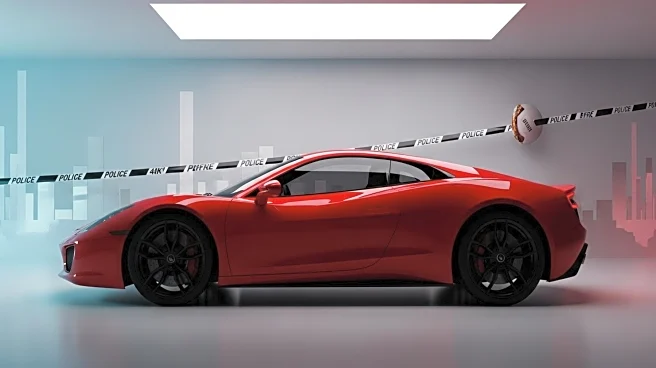What's Happening?
Ferrari, the luxury sports car manufacturer based in Maranello, Italy, has announced a significant update to its financial guidance and electrification strategy. During its Capital Markets Day event, Ferrari revealed that it expects net revenue of at least 7.1 billion euros ($10.7 billion) for the current year, slightly up from its previous forecast. However, the company has revised its 2030 revenue expectations to around 9 billion euros and plans to have a sports car lineup consisting of 40% internal combustion engine cars, 40% hybrid, and 20% fully electric vehicles. This marks a reduction in its electrification ambitions, as the company had previously aimed for a higher percentage of electric vehicles. The announcement led to a sharp decline in Ferrari's stock prices, with Milan-listed shares dropping by 16.1% and U.S.-listed shares falling by approximately 13%. Analysts expressed disappointment, noting that the guidance fell short of expectations and reflected a conservative approach from Ferrari's management.
Why It's Important?
The revision of Ferrari's electrification strategy and financial guidance has significant implications for the automotive industry and investors. By scaling back its electric vehicle ambitions, Ferrari may be signaling challenges in adapting to the rapidly evolving market that increasingly favors sustainable and electric mobility solutions. This decision could impact Ferrari's competitive position against other luxury car manufacturers who are aggressively pursuing electrification. For investors, the stock's sharp decline indicates concerns over Ferrari's growth prospects and its ability to leverage operating efficiencies in the coming years. Analysts have suggested that the conservative guidance may pose risks to earnings per share and valuation multiples, affecting investor confidence and market performance.
What's Next?
Ferrari's updated strategy may prompt reactions from various stakeholders, including investors, industry analysts, and environmental advocates. Investors will likely scrutinize Ferrari's future earnings reports and strategic decisions to assess the company's ability to navigate the transition to electric vehicles. Industry analysts may revise their forecasts and recommendations based on Ferrari's conservative approach, potentially influencing stock market dynamics. Additionally, environmental groups may critique Ferrari's reduced commitment to electrification, urging the company to align more closely with global sustainability goals. Ferrari's management may need to address these concerns and provide further clarity on its long-term vision to reassure stakeholders.
Beyond the Headlines
Ferrari's decision to scale back its electrification goals may have broader implications for the luxury automotive sector's approach to sustainability. As consumer preferences shift towards environmentally friendly vehicles, luxury brands like Ferrari face the challenge of balancing traditional performance and luxury with modern sustainability demands. This development could influence other luxury carmakers to reassess their electrification strategies and market positioning. Furthermore, Ferrari's conservative guidance may reflect broader economic uncertainties, such as fluctuating demand and regulatory pressures, which could impact the automotive industry's trajectory in the coming years.











